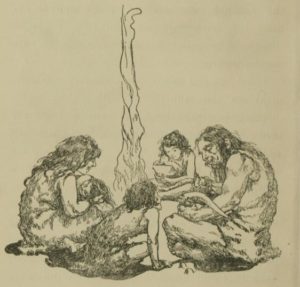How Storytelling Conveys Truth Better Than Non-fiction
 Storytelling is as ancient as man. We have always told stories. It is no coincidence that the bulk of the Bible is made up of stories. Not only narrative, but people telling stories to make points, teach, and convict. Yet in our day, non-fiction sells better than fiction. Especially in Christian circles, novels are often seen as inferior compared to a Bible study or a book on how to better one’s marriage. Many even consider novels a waste of time. Mere entertainment.
Storytelling is as ancient as man. We have always told stories. It is no coincidence that the bulk of the Bible is made up of stories. Not only narrative, but people telling stories to make points, teach, and convict. Yet in our day, non-fiction sells better than fiction. Especially in Christian circles, novels are often seen as inferior compared to a Bible study or a book on how to better one’s marriage. Many even consider novels a waste of time. Mere entertainment.
Yet, studies reveal that when it comes to transmitting truth, a story is a better vehicle to incorporate those truths into our lives. Not only truth itself, but how we learn to interact socially with one another. Non-fiction activates only the language sectors of our brain, while stories can activate not only the language sectors, but smell, feeling, motor movements, and others if descriptive words are used. The studies show evidence that stories actually make changes in people’s lives based on the truth they convey because a reader experiences it. Not merely reads about it.
In fact, this information illuminates the power of stories–they are teaching us something whether it is intentional or not. Through experiencing the reality of a set of characters, we gain a degree of their experience as our own, and it becomes a part of our history and memory. This is why we may have trouble recalling the points in the last seminar we attended, but can easily rattle off a story told in that same seminar.
 I would agree with Mike Duran’s recent blog post here, that fiction is not a good vehicle for systematic theology. I would contend, however, that all fiction will convey some type of theology, philosophy, or moral worldview, and that fiction exposes a reader to the practical experience of that truth better than non-fiction. Fiction helps to make truth concrete and contextualized into our daily lives. Non-fiction is better for defining and describing truth, but it lacks the ability to effectively internalize truth. Storytelling takes theology out of the academic and makes it concrete in everyday life.
I would agree with Mike Duran’s recent blog post here, that fiction is not a good vehicle for systematic theology. I would contend, however, that all fiction will convey some type of theology, philosophy, or moral worldview, and that fiction exposes a reader to the practical experience of that truth better than non-fiction. Fiction helps to make truth concrete and contextualized into our daily lives. Non-fiction is better for defining and describing truth, but it lacks the ability to effectively internalize truth. Storytelling takes theology out of the academic and makes it concrete in everyday life.
I would suggest that what plagues much Christian fiction isn’t so much the desire to convey theological truths, but the mixing of non-fiction with fiction. Both forms are valid and have their place, but when they are mixed into a story, the result tends to be a story that isn’t engaging and/or sloppy/incomplete teaching. The two forms have very different goals and purposes. Non-fiction’s goal is to convey information in an interesting manner. Fiction’s goal is to provide an experience in an entertaining manner.
Non-fiction can use snippets of stories to illustrate truth. However, the more that non-fiction is inserted into fiction, the more problems that arise for that story. The more a section sounds like, “And the meaning of this story is…,” the more non-fiction you have. The less natural a point is to the narrative and characters, the more it will feel as if, instead of enjoying an experience, the reader is being fed information. The more the story smells like a set up to make a point, the more it will appear to be non-fiction disguised as fiction. None of those make for effective fiction or non-fiction.
On the opposite side of the mirror, readers—especially Christian—tend to force a Christian story into a systematic, non-fictional framework. It’s as if they have a checklist: “Bible quotes ? Check. Call to salvation? Check. Good Christian example from lead character? X …what? Fail!” Readers who do that are expecting a story to hit on all points of theology, which is impossible. Even Jesus’s stories didn’t do that. You can’t take the parable of the merchant who sold everything to buy a pearl of great price and deduce a whole systematic theology from it. If you do, it will be very messed up. Stories should be evaluated on the points they do make, not on the ones they aren’t aiming to hit.
 Jesus intentionally told stories to make specific points. He refused to explain them save to His disciples when they asked. He left it for the listener to get the point and apply it. But the rest of his audience? If they didn’t get it, they missed out. Many Christian authors have a hard time doing that. They fear the reader will not get it. For sure, many of them won’t. But those that do, it has a significant impact. Do what Jesus would do: tell the story and allow God to use it as He wills rather than forcing an interpretation of your own upon it. Communicate an experience of truth more so than a message.
Jesus intentionally told stories to make specific points. He refused to explain them save to His disciples when they asked. He left it for the listener to get the point and apply it. But the rest of his audience? If they didn’t get it, they missed out. Many Christian authors have a hard time doing that. They fear the reader will not get it. For sure, many of them won’t. But those that do, it has a significant impact. Do what Jesus would do: tell the story and allow God to use it as He wills rather than forcing an interpretation of your own upon it. Communicate an experience of truth more so than a message.
Reality is that storytelling is the most effective way to convey truth from person to person. That is why God chose to use it, both in the Old Testament and with Jesus Christ in the New Testament, instead of a systematic theology. People have been interpreting it ever since.
What benefits and dangers of using stories to convey truth do you see?
– – – – –
 As a young teen, R. L. Copple played in his own make-believe world, writing the stories and drawing the art for his own comics while experiencing the worlds of other authors like Tolkien, Lewis, Asimov, and Lester Del Ray. As an adult, after years of writing devotionally, he returned to the passion of his youth in order to combine his fantasy worlds and faith into the reality of the printed page. Since then, his imagination has given birth to The Reality Chronicles trilogy from Splashdown Books, and Mind Game, Hero Game, Ethereal Worlds Anthology, and How to Make an Ebook: Using Free Software from Ethereal Press, along with numerous short stories in various magazines. In his Texas Hill Country residence, he continues to create and give wings to new realities so that others might enjoy and be inspired by them.
As a young teen, R. L. Copple played in his own make-believe world, writing the stories and drawing the art for his own comics while experiencing the worlds of other authors like Tolkien, Lewis, Asimov, and Lester Del Ray. As an adult, after years of writing devotionally, he returned to the passion of his youth in order to combine his fantasy worlds and faith into the reality of the printed page. Since then, his imagination has given birth to The Reality Chronicles trilogy from Splashdown Books, and Mind Game, Hero Game, Ethereal Worlds Anthology, and How to Make an Ebook: Using Free Software from Ethereal Press, along with numerous short stories in various magazines. In his Texas Hill Country residence, he continues to create and give wings to new realities so that others might enjoy and be inspired by them.
You may learn more about R. L and his work at any of the following:
Author Website, Author Blog, Author Store, Twitter, Facebook, and Google+.











































[…] How Storytelling Conveys Truth Better than Fiction […]
One book that I feel violated this rule was “The Harbinger.” The plot was pedantic and it felt like the author wasn’t sure what genre he was writing. The character receives a seal, puzzles out the meaning, meets the prophet, hears the actual meaning, and receives another seal. While it could be inferred that the prophet did this so the narrator would investigate for himself, it stilts the story flow.
Just a note about The Harbinger: The author is a Messianic rabbi known for his knowledge of Old Testament and prophecy. The book was meant as a way to convey parallels he saw between OT and present day events. It’s not a traditional novel, no, and if I were his editor, I would have suggested a few change, but he might be said to have created a new genre in his attempt to convey truths in a more palatable fashion than a sermon series. It’s not allegory, it’s not suspense or fantasy or SF or anything we could stick a label on. It’s new. Knowing that, I could relax into the story and just let it be.
Wow, terrific post–will be thinking about this one.
Great article, Rick. Identifying mixing fiction with non-fiction as the problem with preachy fiction is so helpful. It clarifies what too many writers are doing. The idea that their fiction needs to be explained shows the lack of trust in their own storytelling skills and in our Almighty God who will use even our weakness because of His unending strength to draw people to Himself.
To clarify one point–Mike Duran didn’t qualify his thoughts about theology. Our own Stephen Burnett is the one who differentiated between theology and systematic theology. I’m not sure if Mike, in his response comment, expressed agreement with that understanding or not.
I’ll also mention, this is the second week in a row that the study covered by the New York Times has been mentioned. I myself have written about those brain studies a couple times. However, there’s been no collaboration on our part. Each of us has written independently of the other.
Honestly, I don’t see why the findings aren’t bigger news in the Christian writing community. I mean, if as these studies are saying, fiction imprints on the brain in the same way that an actual experience does, how can we not see the ramifications for what we are feeding our minds?
Becky
Thanks, Becky. No, I had no idea anyone else was referring to that study. I don’t recall in Mike’s blog comments who made the point that fiction can’t be expected to fulfill a systematic theology, but I think I recall Mike agreeing with that point in the comments. I think you are right, he didn’t make that distinction in his blog post. I’d have to go back to see. But not containing or unable to contain a systematic theology was a smaller subset of his main premise, that fiction isn’t a good vehicle for communicating theology.
Which in one sense, I agree. That is, you can’t derive your theology from fiction. It is too interpretive, too prone to the demands of good drama, etc. To get a holistic theology of course we need the Scriptures and good teaching on them. That said, fiction can do what non-fiction can’t, which is to experience the theology and integrate it with life. Like trying on a pair of jeans to see if they fit before you buy them. In that sense, fiction does convey theology in a way that non-fiction can’t. Both have their place and need. Which is why Christians dismissing fiction as merely entertainment are missing the bigger picture. It isn’t necessarily a waste of time.
Great thoughts! It’s neat to think that as authors we have a unique ability to “feed” truth to our readers – not by sneaking it into our stories like a desperate mom trying to hide the vegetables in the pasta sauce, but by reinventing the dish in a way that surprises and interests readers. 🙂
I think some Christian fiction authors mistakenly think that if they take the “vegetables” and douse them in enough sauce and chop them small enough, people will eat them up unawares. But the reality is, the veggies will be found out, and the meal might even be rejected because the reader/eater finds the sneakiness distasteful.
BUT, a speculative fiction writer is like a chef who throws together a fanciful meal that will be enjoyable in every part – undoubtedly there will be vegetables included, but they will probably (hopefully!) be prepared in such a way as to make them tasty morsels. Maybe they’re caramelized, with brown sugar or something. 😀 The meal might not be as “healthy” as the one cooked by the desperate mom, but health isn’t always the point. When one goes to eat food cooked by a chef, the chief concern is happy tastebuds!
Hehe, that metaphor kind of ran away with me…
Good analogy, Bethany. Some definite points to be made there.
[…] at the Speculative Faith blog, I posted an article on how fiction affects the brain in the same way real-life experiences do. While non-fiction can transmit information, fiction […]